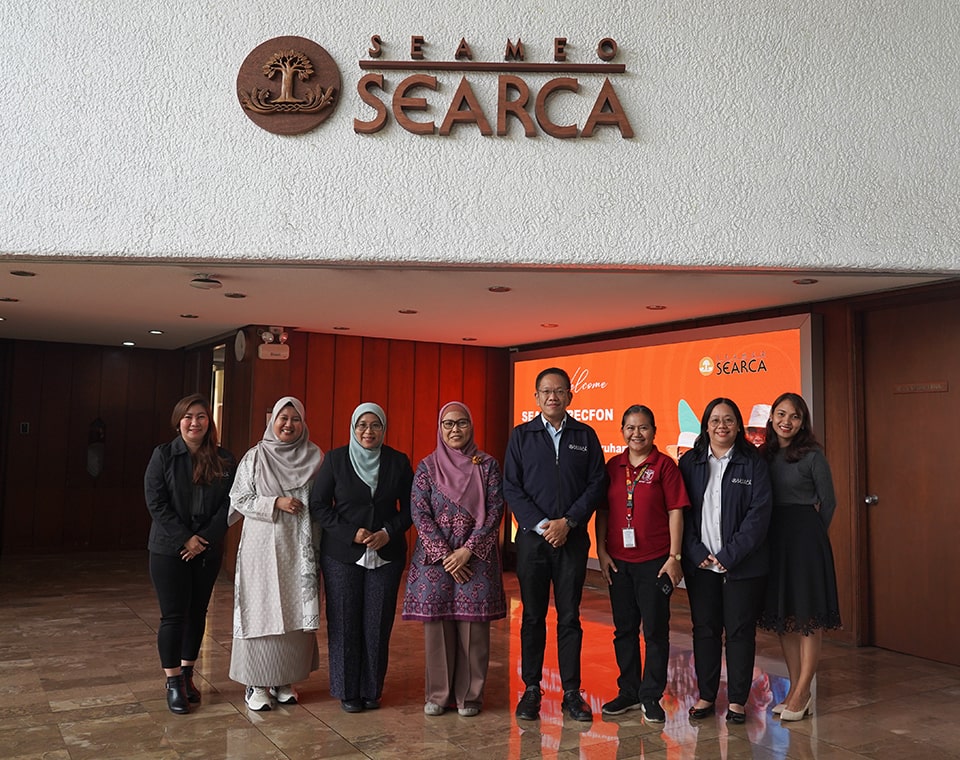Southeast Asia Ministers of Education Organization (SEAMEO) Regional Centre for Food and Nutrition (RECFON) officials Dr. Judhiastuty Februhartanty, Research Unit Manager, and Ms. Indriya Laras Pramesthi, Training Unit Manager, visited the Southeast Asian Regional Center for Graduate Study and Research in Agriculture (SEARCA) on 14 August 2024 to discuss updates on the 2nd SEAMEO International Conference on Food and Nutrition (ICFN) 2024 and explore possible collaborations on their Nutrition Goes to School (NGTS) program. Accompanying them was Dr. Leila Africa, a professor at the University of the Philippines Los Baños Institute of Human Nutrition and Food.

Like SEARCA, RECFON is among the 26 SEAMEO specialist institutions in 11 Southeast Asian countries. It conducts education, capacity building, research, and information dissemination programs in food and nutrition through partnerships for sustainable human resource development.
During the meeting, the RECFON delegation discussed the Center's involvement in ICFN 2024, a conference focusing on the gains, challenges, and opportunities in Southeast Asia's environmental nutrition research, programs, and policies, to be held in September 2024. As event co-organizer, SEARCA will assist in information dissemination, moderate and document specific sessions, and host an institutional exhibit showcasing its initiatives in food, nutrition, and the environment. Dr. Judhiastuty also highlighted the potential for co-publishing the event's proceedings.
Additionally, the visitors presented NGTS, a school-based multisectoral program designed to build character and improve students' learning outcomes and active participation in school activities through proper nutrition, hygiene, and sanitation. The program encompasses four components: nutrition education, school canteen, school garden, and nutrition entrepreneurship. Initially piloted in primary, junior high, and vocational schools in six districts in East and West Java and West Kalimantan provinces in Indonesia, it is now being expanded to Cambodia, Malaysia, and Lao PDR.
Dr. Judhiastuty explained that they don't have direct activities involving the students but instead they focus on empowering the teachers through training sessions on crafting lesson plans. She reiterated that because the teachers tailored their lesson plans to align with their school's specific priorities and available resources, each lesson plan is unique across the different schools.
She expressed interest in SEARCA's School-Plus-Home Gardens Project (SHGP) because of the commonalities between the two undertakings. Ms. Rochella Lapitan, Program Specialist of the Research and Thought Leadership Department (RTLD), provided an overview of SHGP and underscored the alignment between NGTS's four components and SHGP's pillars: nutrition, education, and economics. Ms. Lapitan also cited SHGP's offshoot projects: School-plus-Home Gardens cum Biodiversity Enhancement Enterprise (SHGBEE), which aligns with biodiversity conservation and restoration, and the School Edible Landscaping for Entrepreneurship (SEL4E) Project, which focuses on entrepreneurship.
She also informed the visitors of the upcoming Center of Excellence on Sustainable Agricultural Intensification and Nutrition (CE SAIN)-SEARCA Joint International Conference 2024: Fourth International Conference on Sustainable Agricultural Intensification and Nutrition and the Third International Conference on SHGBEE, which will take place in November 2024 in Siem Reap, Cambodia.
"We are so much alike in how we conceptualize our programs. It is just a matter of figuring out how to collaborate," Dr. Judhiastuty remarked.
The teams identified capacity building, particularly in curriculum integration, as a promising area for collaboration. Dr. Africa suggested a joint publication between the SEAMEO centers comparing the challenges and success factors of SHGP and NGTS.
Ms. Bernice Anne De Torres, Project Coordinator of RTLD, introduced SEARCA's Consortium for Agricultural Development, Research and Extension (CADRE). Envisioned as a network of high-caliber, like-minded institutions, CADRE aims to drive agricultural transformation toward sustainable and inclusive development in Southeast Asia. It will feature five components: collaborative research, policy and program development, technical assistance and capacity building, knowledge management, and partnerships. Dr. Judhiastuty saw CADRE as an entry point of collaboration and is keen to learn more about how RECFON could contribute.
The visitors were received by Dr. Nur Azura Adam, SEARCA Deputy Director for Programs. Also present at the meeting were Ms. De Torres, Ms. Lapitan, and key staff from the Office of the Deputy Director for Programs and Partnerships Unit.